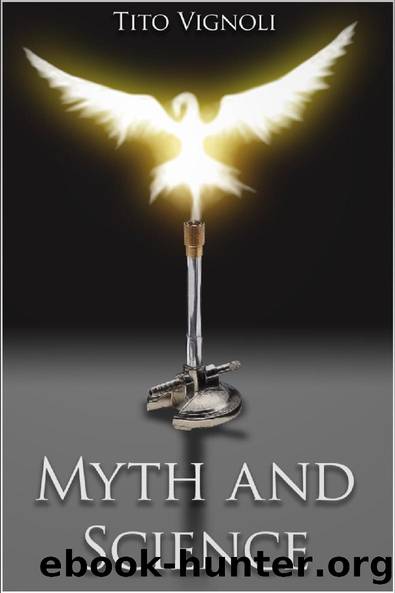Myth and Science by Tito Vignoli

Author:Tito Vignoli
Language: eng
Format: epub
Tags: science, sciences, philosophy, religion, myth, myths, mythology, legend, legends
ISBN: 9781781665664
Publisher: Andrews UK Limited 2012
Published: 2012-06-18T00:00:00+00:00
In fact, as Silvestro Centofonti observes in a lecture on the characteristics of Greek literature, the grand figure of the Æschylean Prometheus is a poetic personification of Thought, and of its mysterious fates in the sphere of life as a whole. First, in its eternal existence, as a primitive and organic force in the system of the world; then in the order of human things, fettered by the bonds of civilization, and subject to the necessities, lusts, and evils which constantly, arise from the union of soul and matter in unsatisfied mortals. Thought is itself the source of tormenting cares in this earthly slavery, yet the sense of power makes it invincible, firm in its purpose to endure all sufferings, to be superior to all events; assured of future freedom, and always on the way to achieve it by reverting to the grandeur of its innate perfection; finally attaining to this happy state, by shaking off all the enslaving bonds and anxious cares of the kingdom of Zeus, and by obtaining a perfect life through the inspirations of wisdom, when the revolutions of the heavens should fill the earth with divine power, and restore the happiness of primeval times. It is evident that in this stupendous tragedy Æschylus is leading us to the truth in a threefold sense: æsthetic, morally political, and cosmic. The supreme idea which sums up the whole value of the composition is perhaps that of an inevitable reciprocity of action and reaction between mind and effective force, between the primitive providence of nature and the subsequent laws of art, both in the civilization of mankind and in the order and life of the universe.
In this way the evolution of the special myth was transformed into poetry by the interweaving, collection, and fusion with other myths, and in the minds of a higher order it was resolved into an allegory or symbol of the forces of nature, into providential laws or a moral conception.
This law of progressive transformation also occurs in the successive modifications of the special meaning of words, so far as they indicate not only the thing itself, but the image which gave rise to the primitive roots. For a long while, those who heard the word were not only conscious of the object which it represented, but of its image, which thus became a source of æsthetic enjoyment to them. As time went on, this image was no longer reproduced, and the bare indication remained, until the word gradually lost all material representation, and became an algebraical sign, which merely recalled the object in question to the mind.
When, for example, we now use the word (coltello), coulter, the instrument indicated by this phonetic sign immediately recurs to the mind and nothing else; the intelligence would see no impropriety in the use of some other sign if it were generally intelligible. But in the times of primitive speech, the inventors of this rude instrument were conscious of the material image which gave rise to it,
Download
This site does not store any files on its server. We only index and link to content provided by other sites. Please contact the content providers to delete copyright contents if any and email us, we'll remove relevant links or contents immediately.
The Art of Coaching Workbook by Elena Aguilar(51198)
Trainspotting by Irvine Welsh(21665)
Twilight of the Idols With the Antichrist and Ecce Homo by Friedrich Nietzsche(18632)
Fangirl by Rainbow Rowell(9250)
Periodization Training for Sports by Tudor Bompa(8272)
Change Your Questions, Change Your Life by Marilee Adams(7781)
This Is How You Lose Her by Junot Diaz(6887)
Asking the Right Questions: A Guide to Critical Thinking by M. Neil Browne & Stuart M. Keeley(5775)
Grit by Angela Duckworth(5615)
Red Sparrow by Jason Matthews(5472)
Paper Towns by Green John(5191)
Room 212 by Kate Stewart(5121)
Ken Follett - World without end by Ken Follett(4732)
Housekeeping by Marilynne Robinson(4447)
The Sports Rules Book by Human Kinetics(4386)
Papillon (English) by Henri Charrière(4274)
Double Down (Diary of a Wimpy Kid Book 11) by Jeff Kinney(4272)
The Motorcycle Diaries by Ernesto Che Guevara(4101)
Exercise Technique Manual for Resistance Training by National Strength & Conditioning Association(4071)
